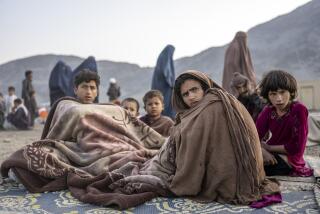U.S. turns attention toward Pakistan after Osama bin Laden’s death
A growing number of U.S. officials, including key lawmakers such as Sen. Dianne Feinstein (D-Calif.), chairwoman of the Senate Intelligence Committee, on Tuesday questioned whether Pakistan sheltered Osama bin Laden and whether the country should continue to receive substantial amounts of U.S. aid.
Speaking to Los Angels business leaders during their annual lobbying trip to Washington, Feinstein said she believed Pakistan was “walking both sides of the street.” On U.S. aid to Pakistan, the senator said: “I think there’s a question about whether this should be continued.”
Feinstein, in a later meeting with reporters in her office, said that she wants to know more about what Pakistani officials knew about Bin Laden’s presence in their country and plans to ask CIA director Leon Panetta about it during a meeting Wednesday.
“We have to know whether they knew,’’ she said. “If they didn’t know, why didn’t they know?’’She added: “It does cause one question how this kind of facility, which stood out, was close by a military academy, could exist for the length of time it did exist, and we now know that Bin Laden was there for up to six years.’’
Bin Laden, who was the leader of Al Qaeda, which was responsible for the 9/11 terrorist attacks on New York and the Pentagon, was killed in a U.S. raid in a fortified compound in Abbottabad, about 60 miles from the capital of Pakistan. The seeming openness of bin Laden’s hideout, which was near a military institute, has raised questions about whether he was being protected by Pakistani intelligence or military officials and whether Pakistan had been as forthcoming as an ally should be about Bin Laden’s presence.
“The only thing missing at the Bin Laden facility was a neon sign,” Sen. Frank Lautenberg (D-New Jersey) said on MSNBC news on Tuesday. He is a member of the Senate Appropriations Subcommittee on State and Foreign Operations, which deals with aid issues.
Lautenberg said Pakistan has received $20 billion in aid over the last eight years and that there is a pending proposal for another $4 billion. “We don’t have that kind of money to spend with people who are not our friends,” Lautenberg said, adding, ”they have to show friendship on a continuing basis.”
Former Secretary of State Condoleezza Rice also raised sharp questions about Pakistan’s role when she appeared Tuesday on several television news shows.
Pakistan “President [Asif Ali] Zardari and his team need to understand better how Osama bin Laden could hide in plain sight in that kind of compound without the knowledge of high-ranking officials,” she said.
“How is it possible that the Pakistan army, Pakistan police and Pakistan intelligence did not know of presence of Bin Laden when it was in such a central place, so distinct,” Sen. Carl Levin (D-Mich.) said in an interview on Tuesday with National Public Radio. “It’s kind of hard to believe that the Pakistan army and the Pakistan intelligence did not know he was there,” said Levin, head of the Senate Armed Services Committee.
United States relations with Pakistan have been a touchy issue for decades, given the country’s frosty relations with India, a key U.S. ally. As Afghanistan has grown from a sore point to a festering war zone, Pakistan’s role in sheltering parts of the Taliban and some elements associated with Bin Laden’s Al Qaeda organization, have hindered the country’s relations with the United States. Complicating relations has been Pakistan’s nuclear arsenal and ambitions.
The deadly raid against Bin Laden also comes weeks after the United States and Pakistan have repeatedly clashed over bombing runs by unmanned U.S. drones that Pakistan have claimed has killed civilians. The countries also disagreed recently over a CIA contractor who was arrested after he was accused of killing two Pakistanis. The contractor was later released.
U.S. officials have walked a careful line in recent days.
John Brennan, White House counter-terrorism adviser, said the administration was looking at whether Bin Laden had a support system in Pakistan that allowed him to remain in the country. Interviewed Tuesday morning on NBC’s “Today” show, Brennan said that “clearly there was some kind of support network that provided him assistance.”
“Whether or not those were individuals inside the Pakistani government is unknown at this point,” he said. Brennan insisted that Pakistan has been “a strong counter-terrorism partner.”
Richard.simon@latimes.com
Michael.muska@latimes.com
More to Read
Start your day right
Sign up for Essential California for news, features and recommendations from the L.A. Times and beyond in your inbox six days a week.
You may occasionally receive promotional content from the Los Angeles Times.








